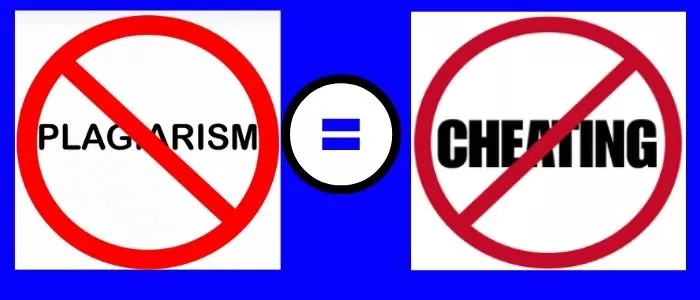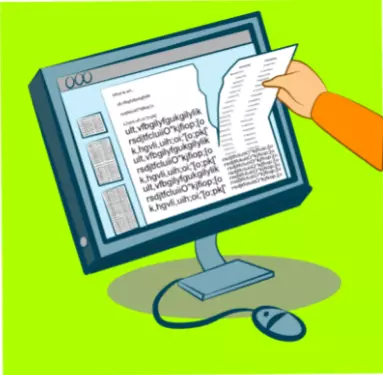Before you begin your studies in any institution, you should go through a code of ethics or a handbook. The chances are high that the same handbook elaborates on the issues of plagiarism.
Many institutions do not tolerate plagiarism. They have a set of rules that handles that are in black and white.
In this post, we want to address the plagiarism issues and the associated dangers in your academic life. Laziness can ruin your reputation if you fail to handle your work from an ethical angle. Let get started.
Why is Plagiarism Bad?
Plagiarism is simply stealing. Like all other forms of theft, plagiarism has its own ethical and legal predicaments that make it a bad idea. The practice of it is not good. Let us look at why it is bad.
Plagiarism is bad because it is a form of academic dishonesty that discourages learning. It is also bad because it is theft where one represents other people’s content as own. More importantly, plagiarism is unethical because the plagiarist immorally gains from the content rather than the rightful owner.
Moreso, plagiarism is an academics dishonesty that can lead to severe consequences for anyone who gets involved in it. s The following are reasons that make us believe that it is a wrong act.
This is something you can avoid. You can overcome it as you do your writing without looking at the sources. These sources should only act as inspirations for what you want to achieve.
1. Drains Academic Values
If you engage in plagiarism, you will be breaching academic integrity. The right procedure is to produce an assignment that reflects your efforts.
When you plagiarize, it implies that you are sacrificing your ability to think and learn the topic properly. As such, a professor will fail to evaluate your skills and knowledge based on your cheating attempts.
2. Plagiarism is Cheating
Plagiarism is stealing someone’s ideas and work. The same acts will be unfair to other students. The institution will not accept one to have the same privileges as other students who put in more effort to produce genuine work.

Plagiarism deprives you of the chance to think critically.
You would rather consult your instructor to assist you in areas of difficulty instead of going for other forms of shortcuts.
The reality is, once found, you will face the disciplinary committee as per the set rules of the institution.
3. Destroys Trust and Reputation
Before you submit your paper, ensure that you eliminate any plagiarism issues. In case you let it go while having a great percentage of plagiarism, the professor will interpret it as participating in academic fraud.
You will be going against the values of the institution, thereby compromising your trust and reputation. Even if you want any references from the same college, it becomes challenging since no one wants to associate with an offender.
4. It is Disrespectful
It calls for respect for other people’s work when you are pursuing the ethical aspect. It is disrespectful to use someone’s ideas to further your academic interest.
You will be taking someone’s work for granted without showing any form of gratitude. It does not matter whether the author of that particular topic reigns from another continent or institution.
It also paints someone badly in the public eye. For example, people who commit incremental plagiarism face shame in public and condemnation for their disrespect to the original owners of the content or speeches they copied from.
5. Affects Your Creativity
Plagiarism is an act that deprives your creative, analytical, and imaginative skills. It is a direct way of stealing someone’s efforts and robbing you of your ability to make matters original from your analytical skills.
Borrowing ideas is not bad as it works as an inspiration for you to know if you are doing the right thing. However, copy-pasting deprives you of the skill to create a unique essay that can bargain good grades.
6. Affects Your Thinking Skills
When you are writing your essay, you have a chance to think critically. You should remain reasonable and avoid manipulations by using other people’s ideas. When you are over-dependent on someone’s work, you will be sacrificing your thinking skills.
Remember, thinking skill is an asset when you are drafting your essay. You should involve your mind to think and come out with some strategic ways of handling that topic.
7. Tough Implications
Many institutions of learning have clear policies on the consequences of plagiarism. One of the outcomes of plagiarism is facing a lawsuit.
If you engage in robbing someone’s work, then you are likely to land in court. The modern legislation has an outline on copyright issues.
Furthermore, plagiarism comes with monetary penalties. When it comes to corporations, you can pay the price in millions.
Lastly, if you are plagiarizing, then it means you are stepping into larger shoes. If you are presenting someone’s effort as your own, then the recipient will expect you to maintain the same level.
Instances when Plagiarism is Bad
1. High Percentage of Similarity
A lenient instructor may exempt you from the offense if the similarity percentage is low. Different colleges and universities have an acceptable limit where they make it negligible.

Depending on the policy, some will overlook it when the similarity is below 5%.
That could be due to some errors such as citation issues or more.
However, plagiarism can be bad if your paper shows a higher percentage of similarity.
If one plagiarized more than 50% of the paper, then it implies a big academic fraud that is punishable.
Firstly, the student will lose the results and probably face some tough disciplinary measures such as expulsion or suspension.
2. Intentional Plagiarism
When one participates in purposeful plagiarisms, then it becomes an academic fraud. Such acts are where one copy-pastes for a different source and presents it as his work to the lecturer.
Some of the reasons students engage in such acts are that reproducing what other experts said makes them look scholarly and professional.
Similarly, others think that learning is a passive process; hence, looking for ideals and reaching is a preserve for experts.
3. Publishing a Plagiarized Essay
Plagiarism could be a severe act when one publishes a plagiarized document on an online platform. If found, the owner of such ideas may take legal action against the offender. If found guilty, you are likely to drain your account by paying for malicious damages.
The law over copyrights defends the owner of the information against one using your idea without your consent. If one is using it, they must quote well to avoid being termed as academic fraud.
Robbing other people’s intellectual property can even land you in trouble with them or your school. Therefore, try to copy without plagiarizing and avoid such issues.
4. Plagiarized Research
It is also the worst form of plagiarism. If the research was in the medical niche, the results could mean that many people would likely lose their lives. That could be heinous, right?
No one is immune to the far-reaching consequences of plagiarism. Before you start to write anything on any project, begin to be sensitive about plagiarism and try to avoid it.
Typically, it is easy to follow the simple rules of overcoming plagiarism. Furthermore, use an online plagiarism checker to kick out any suggestive attributes. Check out some of the best free plagiarism checkers you can use at no cost.
Instances when Plagiarism is Good
Although plagiarism has diverse consequences on the offender, there are situations where plagiarism could be useful to assist one complete the projects as follows:

1. When Citing Sources
When you detect any plagiarism in your projects, you can use it positively to cite your sources.
Here, you will be acknowledging your dependency on using other people’s words or ideas.
As such, you will be distinguishing your work from other sources.
When you cite properly, you will overcome plagiarism and get some credit for the project.
Typically, when you identify plagiarism sources, then you can cite and reference them to be safe.
2. Unintended Plagiarism
When you unintentionally plagiarize, you will track the sources with some similarities and establish if you were sailing in the same boat.
Furthermore, by reading the sources where you have similarities, you will know if you are on the right track by getting inspiration from other authors. Once through, you can paraphrase the sentences to make them look original and unique.

Joseph is a freelance journalist and a part-time writer with a particular interest in the gig economy. He writes about schooling, college life, and changing trends in education. When not writing, Joseph is hiking or playing chess.
